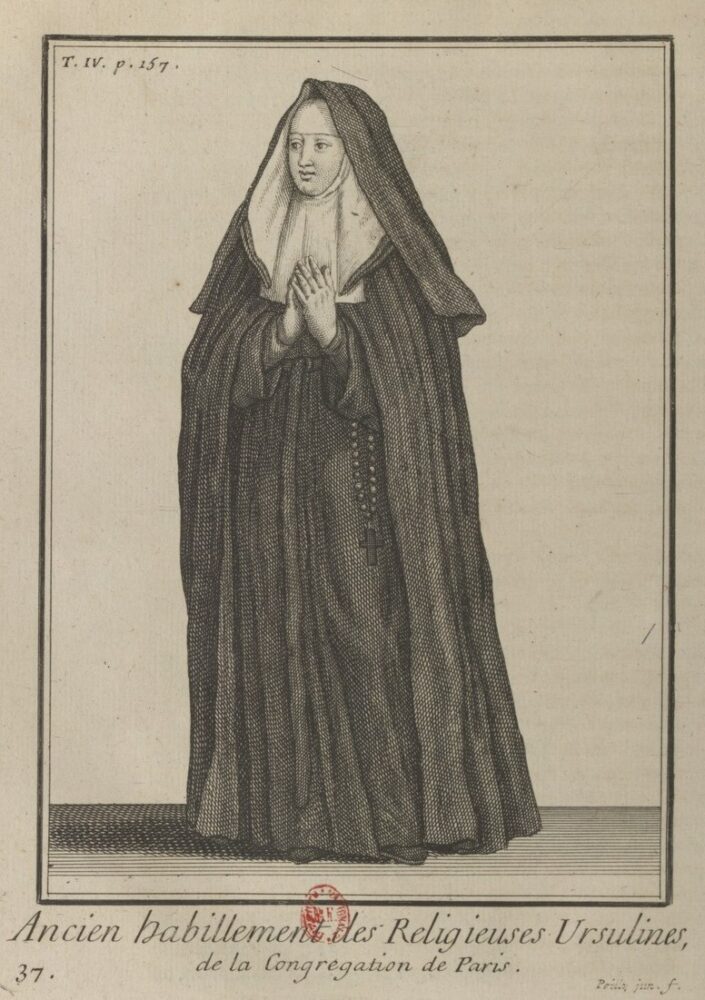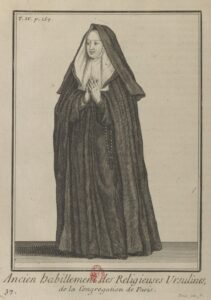Marie Tranchepain
Marie Tranchepain was the first Mother Superior of New Orleans’s Ursulines and an early female diarist.

Courtesy of gallica.bnf.fr / Bibliothèque nationale de France
Engraving of an Ursuline nun from Histoire des orders monastiques, religieux et militaires. Paris: N. Gosselin, 1714–1719.
Marie Tranchepain (ca. 1680–1733), or Marie St. Augustin upon joining the Order of St. Ursula, was the first Mother Superior of the Ursuline Convent in New Orleans. She was responsible for establishing the first school for girls in the United States and is the author of a narrative account of the Ursulines’s transatlantic journey in 1727.
Tranchepain was born in Paris near the end of the seventeenth century to a wealthy family of Protestant merchants from Rouen. Her family moved to Paris before her birth (her exact birthdate is unknown, because parish records from the Protestant Church in Paris were destroyed during a siege of the city by Prussian forces in 1871). At nearby Versailles Tranchepain’s father was part of a special corps of merchants who sold luxury goods to the royal court. However, the family’s fortunes changed in 1685 when Louis XIV revoked the 1598 Edict of Nantes, a decree that declared religious tolerance for Protestants. With renewed persecution Protestants faced penalties such as jail, exile, and state seizure of personal property. Like many, the Tranchepain family renounced their religion, but Tranchepain’s uncle back in Rouen fled to Holland, forcing her father to return home to claim the family estate before it was seized by the state. Tranchepain’s parents raised her secretly as a Protestant until 1698 when she rebelled by asking King Louis XIV to sign a directive removing her from her family and placing her with the Order of St. Ursula. Tranchepain renounced Protestantism and, upon starting her novitiate (a probationary period for joining a religious order), expressed a desire to become a missionary overseas. When ready to become a nun in 1702, Louis XIV paid the customary entrance fee and gave her an annual allowance to cover her daily expenses. When the king died in 1715, Tranchepain’s allowance stopped, leaving her a financial burden to her fellow Ursulines. She sought opportunities to join missions abroad but failed to find one for some time.
Tranchepain’s chance finally came when Ignace de Beaubois, director of Jesuit missions in Illinois, visited Rouen to recruit Ursulines to staff the military hospital in the French colonial capital of New Orleans. Tranchepain signed a contract with the French Company of the Indies stating that, in exchange for the Ursulines’s work at the military hospital, the company would build them a convent, give them a plantation with enslaved Africans to work on it, and provide yearly allowances until the Ursulines became financially self-sufficient. The contract also allowed the Ursulines, who were traditionally a teaching order, to operate a school part time.
In February 1727 Tranchepain embarked with the eleven other women on an unusually difficult voyage across the Atlantic. She described this voyage in a report addressed to her former Mother Superior in Rouen. Upon arriving in New Orleans and discovering that the housing provided for the Ursulines was located far from the military hospital, Tranchepain refused to let the nuns walk there, arguing it violated their rules of cloister. She spent the next years lobbying the company for a convent to be built next to the hospital, refusing to staff it in the meantime as leverage. During this standoff the Ursulines operated a school full time, taking in day students and boarders and teaching catechism to both free and enslaved Native and African women and girls. When the Ursulines took in the many orphans left by the Natchez attack on Fort Rosalie in 1729, those pressuring them to work in the hospital left them in peace.
Tranchepain succumbed to illness in November 1733, one year before the nuns moved into their new convent (on the site of what is called today the Old Ursuline Convent). Thanks to Tranchepain’s tenacity, the Ursulines were able to establish what is now the oldest school for girls in the United States, known today as the Ursuline Academy of New Orleans.
